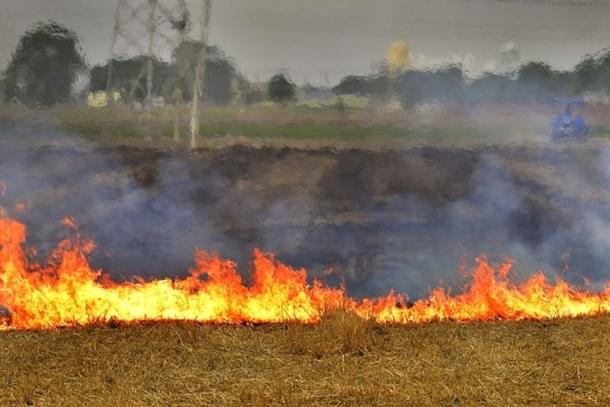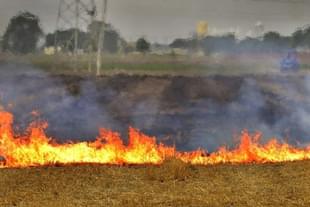News Brief
Central Government Doubles Penalties For Stubble Burning After Supreme Court Rap—All You Need To Know
Kuldeep Negi
Nov 07, 2024, 11:28 AM | Updated 11:28 AM IST
Save & read from anywhere!
Bookmark stories for easy access on any device or the Swarajya app.


The Central government on Wednesday (6 November) doubled penalties against stubble burning and notified new rules under the Environment Protection Act (EPA), 1986 for filing complaints, holding an inquiry, and laying down the adjudication process for environmental pollution.
This comes around two weeks after the Supreme Court termed the Environment Protection Act (EPA), 1986, and the small fines for stubble burning as ‘toothless’.
The Union government notified the Commission for Air Quality Management in National Capital Region and Adjoining Areas (Imposition, Collection and Utilisation of Environmental Compensation for Stubble Burning) Amendment Rules, 2024, for doubling of environmental compensation imposed against stubble burning.
The amended rules were notified under the Commission for Air Quality Management in the National Capital Region and Adjoining Areas Act, 2021, and will come into effect immediately, without a draft being placed in the public domain for public consultation, Indian Express reported.
Under the updated rules, penalties for stubble burning vary by land size: farmers owning under two acres will be fined Rs 5,000; those with two to five acres, Rs 10,000; and over five acres, Rs 30,000.
Earlier, the fines were set at Rs 2,500, Rs 5,000, and Rs 15,000, respectively.`
Additionally, the government notified the Environment Protection (Manner of Holding Inquiry and Imposition of Penalty) Rules, 2024, outlining the process of filing complaints with pollution control boards, the Commission for Air Quality Management, and offices of the Union environment ministry.
It also laid out the process of holding an inquiry on complaints against environmental pollution and that of adjudicating such complaints.
In its 23 October order, the Supreme Court noted that after the Jan Vishwas Act was passed, prosecution for violation was replaced by penalties.
However, Rules were not notified to give this provision an effect.
“The substituted Section 15 has been rendered completely ineffective due to inaction on the part of the Government of India. Neither the Rules are framed to support the said provision nor has the appointment of adjudicating officers as provided in Section 15C been made, though more than six months have elapsed since the date the substituted Section 15 came into force,” the bench of Justices Abhay S Oka, Ahsanuddin Amanullah, and Augustine George Masih said.
“As the adjudicating officers are not appointed under Section 15C, the law-enforcing machinery cannot impose penalties under Section 15. In the absence of machinery created by the Government of India, Section 15 as substituted has become toothless,” the order stated.
The apex court also expressed displeasure over the selective and inadequate action to recover environmental compensation for burning paddy stubble.
“Unless proper exercise of power under Section 15 of the Act is made, there cannot be any effective action against the wrongdoers. We expect the Government to take action within two weeks from today,” the bench said in the order.
Kuldeep is Senior Editor (Newsroom) at Swarajya. He tweets at @kaydnegi.





